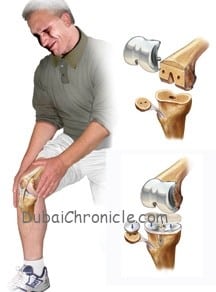There has been an increase in the number of knee replacement surgeries among older people worldwide. The reason for that is partly a desire to stay active and spreading joint-damaging obesity.
A new study published in the Journal of the American Medical Association involved more than 3 million patients, aged 65 and older, who got artificial knees from 1991 through 2010. Almost 10 percent of the patients had their worn-out artificial joints replaced.
 The number of initial knee-replacement operations each year on these older folks more than doubled during that time, hiking to nearly 244,000 in 2010. Patients were in their mid-70s on average when they had the procedure and that age increased slightly during the study.
The number of initial knee-replacement operations each year on these older folks more than doubled during that time, hiking to nearly 244,000 in 2010. Patients were in their mid-70s on average when they had the procedure and that age increased slightly during the study.
The aging population and growing numbers of Medicare patients contributed to the increase. However, the per capita rate also went up, from about 3 operations per 10,000 patients in 1991 to 5 per 10,000 in 2010.
According to lead author Dr. Peter Cram, an associate professor of internal medicine at the University of Iowa, there’s a big percentage of older adults who live longer and want to remain active. That is why they decide to have a knee replacement surgery.
The growth rate slowed in more recent years. The reason for that is probably the fact that a rising number of younger adults have also been getting artificial knees, which typically last 15 to 20 years. The recent bad economic conditions may also have slowed demand for an operation that costs about $15,000 in the United States, but much cheaper in Bulgaria for example.
The authors of the study said that about 600,000 knee replacement operations are done each year in the United States on adults of all ages, costing a total of $9 billion. A journal editorial notes that measures are needed to control costs of these operations. It added that demand only in the US is expected to grow to as many as almost 4 million knee surgeries annually by 2030.
The percentage of obese older patient getting their first surgeries is almost 12, up from 4 percent. The rate was about the same in those getting replacements. Obesity damages joints and can be the main reason for knee replacement operation. It can even contribute to the degradation of the knee, because the knee of an obese person is under more weight and pressure compared to a healthier individual, increasing the possibilities of osteoarthritis.
Moreover, knee replacement is considered a major surgery and there are tests that patients are required to take to make sure that they fit to be on the operation table. Obese patients usually have problems with that because their weight condition makes them vulnerable to high blood pressure and heart ailments. This means doctors will have to take extra precaution during the actual surgery and sometimes surgery is not even an option once obese patients have been found to have other medical problems.
The knee replacement surgeries growing number was discussed during the International Congress for Joint Reconstruction – Middle East (ICJR-ME) wich took place in Dubai in March 2012. More than 40 international and regional joint reconstruction experts attended the event.






























